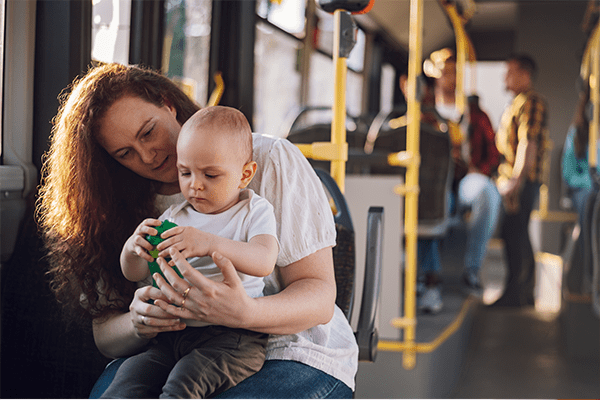How Co-Parents can Prevent Adverse Childhood Experiences (ACEs)
Parental separation is one of the most common adverse childhood experiences. Learn how to help your children avoid negative impacts from ACEs.
- 3 min read
- child development
- guest author

Adverse childhood experiences (ACEs), as defined by the Centers for Disease Control (CDC), are potentially traumatic events that occur during a person’s childhood. Common examples of ACEs include:
- Abuse
- Witnessing violence
- Death of a family member
- Instability due to parental separation
ACEs are unfortunately common—the CDC reports that about 64% of adults say they experienced at least one ACE by age 18. Minimizing and preventing ACEs benefits a child’s current and future overall health and well-being.
Parental separation is one of the most common adverse childhood experiences. The research suggests that, with parental separation and divorce, it is not specifically the separation that results in the adverse experience; instead, it is the presence of conflict, isolation, and lack of physical and psychological safety.
Successful co-parenting that minimizes conflict between parents and prioritizes peaceful, respectful communication is a protective factor against the adverse effects of parental separation. Additionally, the most critical and salient finding shows that the most significant protective factor is when a child has at least one parent or a trusted adult that can meet the emotional and physical needs of the child and promote their psychological well-being.
The importance of a trusted primary caregiver is rooted in the attachment literature in the field of developmental psychology. Attachment occurs in infancy and often sets the pattern of behavior and responses in later relationships. Attachment theory suggests that infants securely attached to a safe, reliable primary caregiver who can be trusted to meet their needs have healthier adult relationships and greater emotional and physical health in adulthood. The key here is trust, so how do we focus and promote trust following separation and during co-parenting?

4 important areas to promote trust following parental separation
1. Trust in a safe, predictable environment
We all want predictability to feel safe and secure. A child can predict what happens next when consistent environments and routines are maintained. Predictability in a child’s life is crucial following parental separation, as patterns and environments are likely disrupted. Successful co-parenting involves ensuring a child experiences consistency and is informed before changes to their routines occur.
2. Trust in a relationship
This comes down to trust that conflict can be repaired, trust in an adult’s word, and predictability of parental responses. In all relationships, including the parent-child relationship, there will be conflict. Often in co-parenting relationships, children can feel “in the middle” with communication between co-parents. If possible, model appropriate contact with a co-parent for your children; if not, find other ways that do not include the child as a go-between. Open communication between children and parents must also be fostered so children feel safe communicating their feelings. Children need to trust that they can express their feelings without impacting the relationship and love of their parents. Children should understand that they are not responsible for their parents’ emotional reactions.
3. Trust that a parent will take care of themselves
Since parents have likely experienced an ACE, it is essential to remember that divorce or separation may cause a re-experiencing of trauma. Children will sometimes engage in protective behaviors of parents during this time due to their concern for their parents’ well-being and safety. Parents need to minimize this as much as possible by getting the help they need, communicating to their children how they feel (when appropriate and in developmentally appropriate terms), and modeling effective coping strategies they use to heal. Though you should shield children from more profound issues that they may not be ready for developmentally, telling them how you feel may be helpful because they will likely notice. Statements such as “I just feel kind of sad today, but I think a walk may make me feel better” give children an understanding without delving into the issues too deeply.

4. Trust in themselves
A child may feel a loss of control during and after parental separation. Helping them have some agency during this time supports their well-being and overall feelings of safety. Provide children with choices when appropriate and allow them to discuss ways they would like to become more involved in scheduling, designing their spaces, or other suitable tasks. While a child may feel a loss of control during this time, small opportunities can go a long way to promote feelings of security.
For co-parents who wish to shield their children from conflict following separation or divorce, effective and respectful communication is key. A communication service like TalkingParents can be useful. All interactions between parents within TalkingParents are saved to an Unalterable Record, which can help hold co-parents accountable to their words and actions and reduce conflict. As previously stated, one of the primary causes of ACEs after parental separation or divorce is the presence of conflict, not necessarily the separation itself. Therefore, any method that can be employed to reduce conflict in shared parenting situations is key to the well-being of the child.